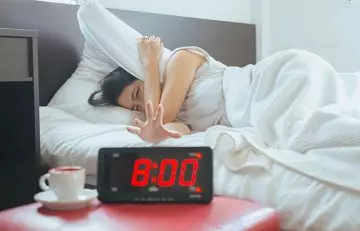7 Bedtime Mistakes That Make Us Gain Weight At Night

Image: Shutterstock
It’s not just the diet you follow that shows on your belly and elsewhere. Your entire lifestyle might be at fault, leading to weight gain! For example, a sedentary lifestyle is a major reason why many people pack in the pounds. And so are bedtime habits. As hard as that may be to believe, the daily rituals you carry out in the evening might make their presence felt as extra kilos on your body. So, if you want to control and manage your weight issues, it might be time to ditch the following 7 bedtime habits for good!
1. Midnight Snacking
Whether it’s a small bite in the middle of the night or a late dinner, ideally you shouldn’t have any food after 7 pm (1). But you do that all the same, don’t you? Well, you shouldn’t as research has conclusively shown that there’s a strong link between weight gain and eating late at night (2). Besides weight gain, midnight snacking can also raise your insulin and cholesterol levels and have a negative impact on your hormonal markers. Something you should keep in mind is that consuming more calories than you burn will also cause weight gain.
2. Sipping On Coffee Late At Night
The fact that a cup of coffee late into the night can upset your sleep cycle is well known (3). But did you know that this same cuppa can also add to your pounds? Studies show that coffee contains a substance known as chlorogenic acid, which can increase your weight (4). If you must drink coffee, make sure you have it either 6 hours before you hit the bed or, alternatively, have warm herbal tea instead to quench your caffeine thirst.
3. Not Sleeping Enough
Sleeping for around 7 to 8 hours every night is perfect, according to most sleep specialists (5). However, if you sleep fewer hours than the aforementioned ones, you may notice a rise in the health problems you face. Previous studies have already managed to establish a link between lack of sleep and how it negatively impacts your metabolism (6). Moreover, not sleeping enough can cause fatigue, which means you will be too tired to work out the next day and won’t lose weight.
4. Skipping The Evening Exercise
Most people don’t have time in the morning to work out, which is why the evening is considered the preferred time to exercise. However, if you don’t exercise at this time too, you might be doing your body a great disservice. Physical activity is integral to weight loss as it boosts your metabolism and helps burn calories (7). Ergo, you should exercise a little daily, even if you just stroll for 15 minutes as you could burn a total of 100 calories. Add it up and you’ll see that you’ve burned 700 calories in just 7 days, which comes up to a weight loss of 4.5 kilos in just a single year!
5. Staying Hooked To Your Gadgets At Night
Every gadget you own – from your laptop to your phone – gives off a blue light that can disrupt your circadian rhythm and make it harder to fall asleep (8). This can, in turn, lead to weight gain as we’ve already established a link between sleep deprivation and weight loss. So, if you’re bored at night and don’t know what do, keep the gadgets aside and pick up a book instead. You can also listen to soft, relaxing music as it’ll help you fall asleep.
6. Setting Your Alarm To A Later Time
The temptation of catching a few extra winks before you eventually have to get up and get dressed for your workday might be enough for you to set your alarm for a time that’s too late. However, that’s not entirely a good idea. Scientists say that those who rise and shine early and soak in the morning sun tend to have a lower BMI (body mass index) than those who don’t (9). Just about 20 to 30 minutes of the early morning sun can influence your BMI positively.
7. Sleeping In A Brightly Coloured Room
As cheery and pretty a brightly coloured room might look during the different hours of the day, it’s wrong to sleep in one. Ideally, you should be sleeping in a room of a lighter shade, such as blue, as it induces a sense of relaxation and ensures sound sleep. Besides, blue can also help curb your appetite so it might be a good idea to get your whole house painted blue! Besides, bright colours such as orange and red promote hunger anyway.
Do you make any of these bedtime mistakes on a regular basis? If so, you should try avoiding them now so you can finally get the weighing scale to point to a number you’d want to see.





























